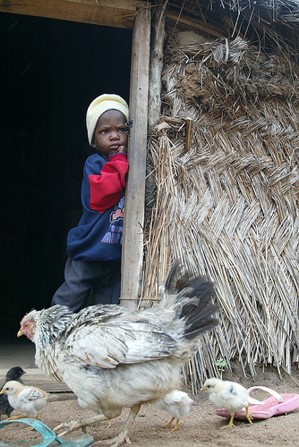Project in Burkina Faso
"Un Oeuf" (One Egg): Improving Nutrition in Children Under Two through Increased Egg Consumption in Burkina Faso
Timeline: May 2018 - April 2019
Funding: USAID
Related project: Enhancing Egg Consumption through Women’s Empowerment in Burkina Faso
Principal investigator (PI) and lead institution
Sarah McKune, University of Florida
Co-PI and collaborator institutions
- Aissata Wereme, Institute de l’Environnement et de Recherche Agricole INERA-Burkina Faso
- Anteneh Omer, Hawassa University, Ethiopia
Journal Articles
- Ernyey, H., Tiwari, C., Stark, H., N’Diaye Wereme, A., Zare, Y., Omer, A., and McKune, S. 2024. Effect of egg consumption on early childhood development: Evidence from Un Oeuf study. Public Health Nutrition. https://doi.org/10.1017/S1368980024002490
- McKune, S.L., Stark, H., Sapp, A.C., Yang, Y., Slanzi, C.M., Moore, E.V., Omer, A., and N’Diaye, A.W. 2020. Behavior change, egg consumption, and child nutrition: A cluster randomized controlled trial. Pediatrics, December 146 (6) e2020007930. https://doi.org/10.1542/peds.2020-007930
- Stark, H., Omer, A., Wereme N'Diaye, A., Sapp, A.C., Moore, E.V., and McKune, S.L. 2020. The Un Oeuf study: Design, methods and baseline data from a cluster randomised controlled trial to increase child egg consumption in Burkina Faso. Maternal and Child Nutrition, e13069. https://doi.org/10.1111/mcn.13069
Resources
- Educational flip book. 2019. Un Enfant, Un Oeuf, Par Jour: English version. Un Enfant, Un Oeuf, Par Jour: French version.
- Innovation Summary. June 2020. Training Approach to Increase Egg Consumption Among Children
Video about Methods & Initial Findings
Link to video: https://youtu.be/s8kucQqRH6w
Project Plan
 Burkina Faso is burdened by high rates of malnutrition and stunting in children under 5 years old. Undernutrition can have significant long term physical, cognitive, and socioeconomic impacts on a child’s development, as well as on the future economic success of the country. Animal source food (ASF) consumption can improve growth, nutritional status, cognitive development, and health in children. In Burkina Faso, ASF consumption is low, particularly among women and children. Livestock is typically produced for income, gifting, and socio-religious practices, rather than for direct household consumption. Barriers, such as cultural beliefs and stigmas, prevent the consumption of chicken eggs in Burkina Faso and many other parts of Africa.
Burkina Faso is burdened by high rates of malnutrition and stunting in children under 5 years old. Undernutrition can have significant long term physical, cognitive, and socioeconomic impacts on a child’s development, as well as on the future economic success of the country. Animal source food (ASF) consumption can improve growth, nutritional status, cognitive development, and health in children. In Burkina Faso, ASF consumption is low, particularly among women and children. Livestock is typically produced for income, gifting, and socio-religious practices, rather than for direct household consumption. Barriers, such as cultural beliefs and stigmas, prevent the consumption of chicken eggs in Burkina Faso and many other parts of Africa.
This study aimed to address the challenges to ASF consumption and improve smallholder farm poultry practices in rural Burkina Faso. As an innovative intervention intended to increase egg consumption, chickens will be given by religious leaders as gifts to children between 6 and 12 months of age. Each child’s caregiver will commit to feeding their child one egg a day from the gifted chickens. Children are often the least likely to consume ASF, despite their unique needs. Because food allocation inequities often exist, this study design proposes that the child be the true owner of the chickens as well as the beneficiary and recipient of the eggs for consumption.
This study properly tested a pilot study conducted in Ethiopia that increased the portion of children consuming 3 or more eggs a week from 5% to 70% through the gifting of chickens by religious leaders to children. It involves behavioral change methods that empower caregivers as poultry producers by improving their access to livestock production resources, providing tools for improved decision making, and enhancing knowledge of nutrition. This study targeted vulnerable populations of smallholder farms and women and children, and it intends to improve poultry production, egg consumption of children, nutrition, and household level resilience.
Objectives
- Increase ASF production through gifting of chickens and provision of monthly agricultural training on proper chicken husbandry.
- Increase ASF consumption, particularly eggs, through innovative behavior change package and culturally-tailored, integrated nutrition and agriculture trainings.
- Build resiliency by increasing food security in targeted households.
- Promote gender equality by engaging women in animal extension services and training female caregivers in chicken husbandry practices to increase flock size
- Reduce zoonotic diseases through integrated nutrition and agriculture training and WASH sanitation education
More information
 October 2020 research update MCKUNE VGM (Virtual General Meeting)
October 2020 research update MCKUNE VGM (Virtual General Meeting)
-
Fact sheet: Improving Nutrition in Children through Increased Egg Consumption in Burkina Faso
- Page on ClinicalTrials.gov
Photo credit: ILRI
Feed the Future Innovation Lab for Livestock Systems is part of Feed the Future





